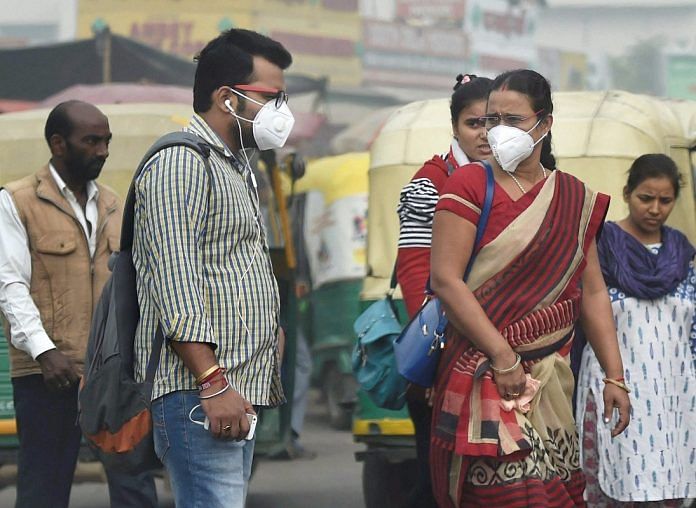Toxic air hampers verbal and mathematical abilities; elderly people are more vulnerable as cognitive damage increases risks of Alzheimer’s.
New Delhi: Exposure to air pollution over a long period of time significantly damages the cognitive abilities in individuals, a new study has found.
The report, ‘The impact of exposure to air pollution on cognitive performance’ — published Tuesday by Proceedings of National Academy of Science (PNAS), USA — examined the relationship between cognitive test scores of 32,000 citizens in China with short-term and long-term exposure to air pollution. The test performance was observed for different age-groups ranging from 10 to 65 plus.
It found that long-term exposure (up to three years) to air pollution hampers the verbal as well as mathematical abilities in people. The negative impact of air pollution, however, was observed more on verbal abilities than mathematical abilities.
An increase in pollution level over seven days led to a drop in verbal test scores by 0.278 points. However, the same amount of increase in air pollution in three years led to a drop of 1.132 points in the verbal test scores.
The damage caused by air pollutants was found to be more pronounced in the elderly than younger individuals. This could impose substantial health and economic costs on citizens, especially for senior citizens who need cognitive functioning for running daily errands and making high-stake decisions in their lives. The cognitive damage could further lead to increased risks of Alzheimer’s disease and other forms of dementia for the elderly.
Also read: Indian cities are choking but there have been just 6 air pollution convictions in 2014-16
Grey cells matter
The study found that men are more vulnerable to cognitive impairment due to air pollution than women. This gender gap is especially more when it comes to verbal abilities than mathematical abilities.
The study explains that this discrepancy could be due to the gender difference in white and grey matter levels, “since men have a much smaller amount of white matter activated during intelligence tests, their cognitive performance, especially in verbal domain tends to be more affected by exposure to air pollution”.
Also, the damage caused by air pollution to cognitive abilities in men above the age of 44 years, who had no prior education was more pronounced than those men (above 44 years) who had at least primary school education.
It was then observed that reducing PM10 (particulate matter 10 micrometres or less in diameter) levels over a period of three years in the same environment increased the average verbal test scores by 2.41 points and math test scores by 0.39 points. This reverse effect too was more pronounced in less educated men over the age of 64 whose verbal test scores increased by 9.18 points over three years.
Implications
“These research findings on China, the largest developing country with severe air pollution, also shed light on other developing countries,” said Xiaobo Zhang, the author of the study and chair professor of economics at Peking University, Beijing.
The reasons for the impairment are ambiguous but according to the study, the decreasing performance of those observed could be due to behavioural changes caused by air pollution. For example, they may become more impatient or uncooperative when exposed to more polluted air. However, there is also a possibility of changes in the brain chemistry or composition due to exposure to air pollution that can impair cognition.
Also read: More Indians are being diagnosed with lung cancer, and it’s not because they’re smoking
“This finding has been neglected in the policy discourse, and has important policy implications,” added Xiaobo.



